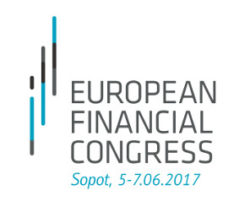European Financial Congress

In just under two weeks, the 7th edition of the European Financial Congress, co-organized by NDI SA, will take place in Sopot. As every year, NDI SA patrons debates in the so-called infrastructure block.
The theme of this year’s Congress is Capital, taxes and international solidarity in the 21st century.
We kindly invite You to participate in the debates belonging to the infrastructure block:
Interventionism in economy – its benefits and boundaries of rationality, June 6, 9:30 – 10:45
Debate description:
Social order is shaped by many factors and entities. In Europe, there is a special situation compared to other regions of the world, because public authorities function on three levels, not two. Above the state and local authorities, there are EU authorities, which have a particularly strong influence on the course of economic processes. Since the announcement of Brexit in 2016 and as a result of the emergence of strong social movements in many EU Member States, there has been a lively debate as to how far the EU authorities can intervene in the process of shaping social and economic changes taking place throughout the EU and in individual countries.
How this interventionism should be extended or limited is a future issue, which needs to be considered not only when it comes to the past, but in the light of emerging ideas and challenges. The discussion on developing Company-Ideas as an element of the open eyes economy is one of the most important issues, and the other are the challenges related to technology development.
Invited to the debate:
• Dariusz Filar, Professor, University of Gdańsk
• Jerzy Gajewski, President, NDI S.A.
• Mirosław Gronicki, Independent economic consultant, Minister of Finances in the years 2004 – 2005
• Jerzy Hausner, Professor, Cracow University of Economics
• Paweł Wojciechowski, Chief Economist of ZUS, Ambassador of the Republic of Poland – OECD Permanent Representative in the years 2010 – 2014
E-mobility – who will pay this bill, June 7, 10:45 – 12:00
Debate description:
E-mobility can be crucial for the ongoing public discussion on the future of socio-economic systems, both in the global and European, as well as in the national scale. Over the last ten years, public authorities at various levels (global, community, state member state, regional and local) have published a number of documents of conceptual and strategic nature, indicating the direction of development and constituting a tool to support the evolution of e-mobility. In accordance with the provisions of the “European strategy for low-carbon mobility” of 2016 and “Development plan for electromobility in Poland: Energy for the future”, adopted by the Council of Ministers of the Republic of Poland on March 17, 2017, electric vehicles used in, among others, car-sharing model, integrated with intelligent electro-energetic grids, are to become important elements of urban transport systems in the future.
The implementation of the e-mobility concept will therefore require deep convergence of three sectors: transport, energy and ICT. Programming the development of e-mobility requires answers to the following questions: what are the possibilities and constraints (technological, economic, legal, financial) of the development of this concept and what conditions should be met in order to realize the vision of e-mobility in Poland?
Invited to the debate:
• Krzysztof Biernat, Professor, PIMOT
• Mateusz Figaszewski, Assignee of the Board for the Development of e-Mobility and PR, Solaris Bus & Coach SA
• Jerzy Gajewski, President of the Board, NDI S.A.
• Danuta Grodzicka-Kozak, President of the Board, Voivodship Fund for Environmental Protection and Water Management in Gdańsk
• Michał Kurtyka, Under-secretary of state, Ministry of Energy (tbc)
• Paweł Wideł, Government Relations and Public Policy Director, Poland, Czech Republic & Slovak Republic, General Motors Poland Sp. z o. o.
You can find more information about the Congress at www.efcongress.com.

